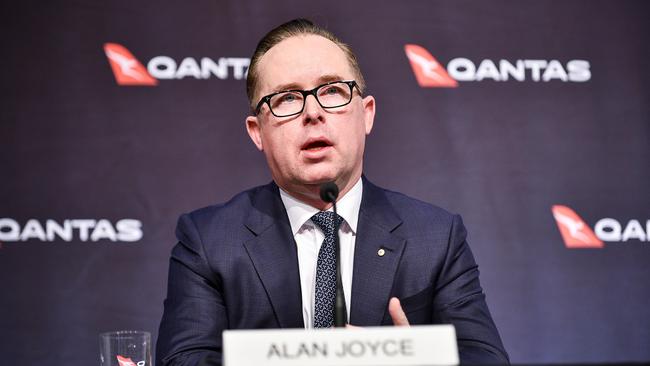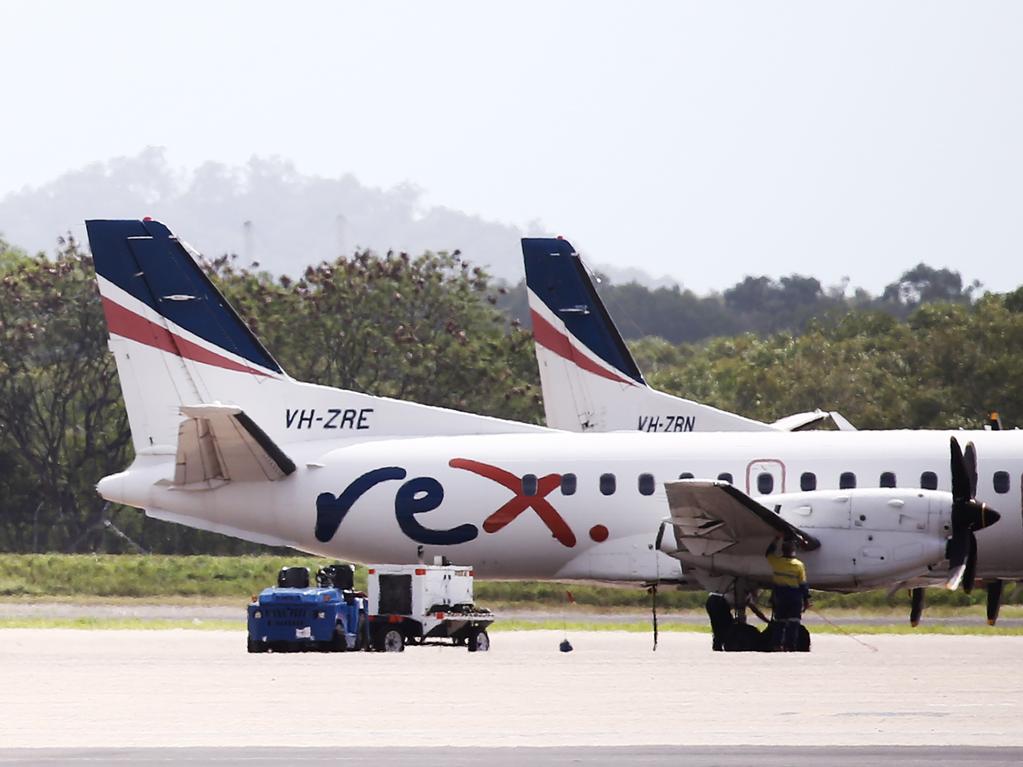Qantas boss tips higher airfares and fewer flights post-COVID
Alan Joyce says higher airfares are likely in a post-COVID world as airlines seek to return to profitability.

Qantas chief executive Alan Joyce has flagged the likelihood of higher airfares in a post-COVID world as airlines seek to dig themselves out of debt and return to profit.
Mr Joyce was speaking at the CAPA Centre for Aviation summit, which heard that since the start of the health crisis, airlines worldwide had borrowed or raised $100bn.
Qantas has raised more than $3bn in the form of bank loans, bonds and an institutional placement and share offer, to allow the airline to ride out the crisis and restructure.
Although managing cash was the focus at the moment with Qantas burning through $40m a week, Mr Joyce said returning to profit would be the priority when flying resumed.
“What we’re going to have to see if there’s a hit on some of the business traffic and other traffic, is starting to see slightly more expensive airfares being sold,” he said.
“People may not even notice because you could actually get a $10 or $20 (increase) on the fare structure and have a big impact on revenue.”
He also flagged the need for “capacity discipline”, which could mean a lower frequency of flights.
Qantas was not expecting international flights to resume until July next year but Mr Joyce said when they did, travellers would be looking for non-stop services that avoided “hubs”.
To that end, Qantas’s fleet of Boeing 787s would give the carrier a very broad network and allow it to operate routes without stopovers, he said.
The business case for Project Sunrise flights between Australia’s east coast and London and New York was also likely to be strengthened as a result of the pandemic.
“There will be opportunities for us to get even better deals (on aircraft),” he said.
“We also have to replace our domestic fleet and this is a good time for airlines that can afford it to be positioning themselves for the future.”
Despite widely held concerns business traffic would take longer to return in a post-COVID world, Mr Joyce said he did not think it would be “as dire as people are suggesting”.
“For us there’s swings and roundabouts.
“With Virgin Australia potentially moving in the marketplace, we’ve had a lot of corporates knocking on our door and we’re forecasting it will take us to 2023 to get back to where we were before COVID-19.”
Virgin Australia CEO Paul Scurrah also spoke at the summit, and conceded the airline was likely to lose market share to Qantas when Virgin emerged from administration.
But he said that would largely be due to Virgin’s renewed focus on profitable routes.
“I do expect we will lose market share because there were routes that weren’t making money that we’ll pull off (and) there’ll be markets that we do want to hold on to,” Mr Scurrah said.
He backed Mr Joyce’s call for a fact-based approach to border closures and hot spots, and vowed Virgin Australia would put services on to New Zealand as soon as they were able. “We’d jump at it because we’ve got aircraft we want to deploy as soon as we can,” he said. “We’re strongly advocating for whatever work needs to be done to establish a bubble.”
The notion of inter-country bubbles drew ridicule from Qatar Airways CEO Akbar Al Baker who told the summit such proposals were “completely stupid”.
“I don’t see what is the reason where countries are making bubbles for airlines, it doesn’t make sense,” he said. “We want to be a reliable global connector.”
EARLIER
Qantas chief executive Alan Joyce has raised questions about government subsidies paid to competitor Regional Express which is now planning to take on the larger airline on the lucrative Golden Triangle routes of Sydney-Melbourne-Brisbane.
Speaking at the CAPA Centre for Aviation summit on Wednesday, Mr Joyce said Rex’s planned expansion in the midst of the COVID crisis “did not feel right” to him.
“The issue around Rex for us, is the government support that we’ve all been given and it’s helped us get through this,” saidMr Joyce.
“We’ve got three airlines in the market at the moment – Qantas that’s having to lay off 6000 to 8500 people, that’s borrowing against aircraft, that’s raising equity to get through this, we’ve had Virgin go into administration and we have Rex get the biggest assistance from the government and saying they may take loans on aircraft to get more aircraft. That doesn’t feel right, doesn’t seem right. They should not be using government subsidies to actually fund the growth.”
He also queried whether the $30m Rex planned to spend on five to ten narrow body jets to operate between Sydney, Melbourne and Brisbane was enough.
“We set up Jetstar in 2003 and it was $120m to set up an airline back then,” said Mr Joyce.
“To set up an airline is quite an expensive thing so I hope they’ve done the numbers correctly.”
Rex revealed in its annual results this week, it and received $62.1m in grants and subsidies from the federal government.
According to the government’s grants site, another $40m was paid to the carrier for the period from July to September, withmore expected for the final quarter.
The airline’s deputy chairman John Sharp, is a National Party member, who served as Transport Minister in the Howard governmentin the 1990s.
Mr Joyce said he was not concerned about competition, with Qantas having seen a raft of airlines come and go.
“In previous years (we’ve seen) OzJet, Compass 1, Compass 2, Virgin, Impulse, and there will be more competition coming through and Qantas is well equipped to be able to cope with that,” he said.
The Qantas CEO repeated his calls for border closures to be based on science, saying businesses needed certainty to operate.
“If this keeps going on those 1 million jobs (in the tourism industry) those little businesses will not survive. They can’t hold their breath for long enough,” he said.
“Qantas can, but we should be considering the long-term implications. At the moment there seems to be no fact-based advice around which borders are opening and which are closing.
“We’ve reached a point where something has to change.”





To join the conversation, please log in. Don't have an account? Register
Join the conversation, you are commenting as Logout